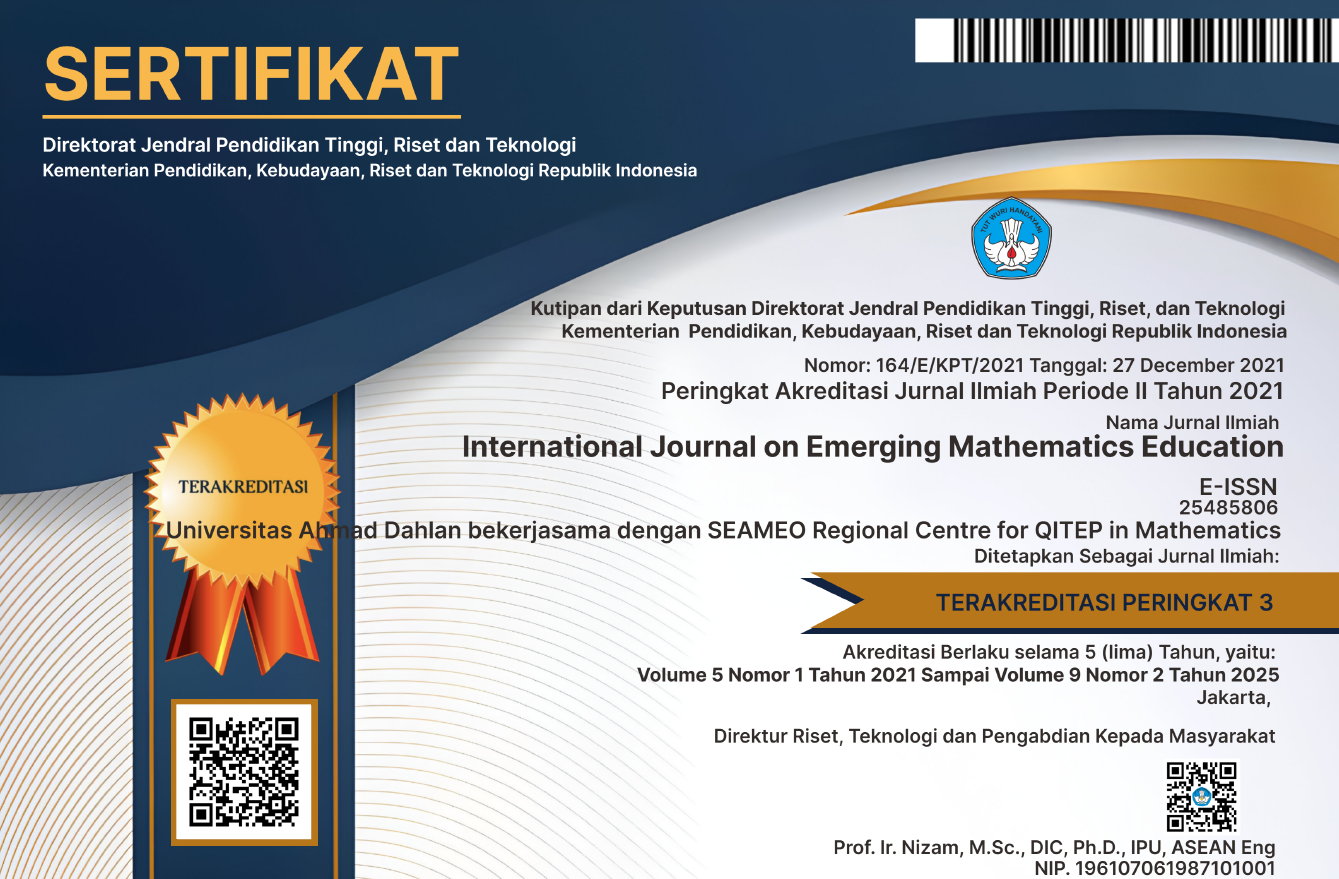Mathematics Curriculum Review In Junior Secondary School Level: Implementation Of Web-Based CRMS
DOI:
https://doi.org/10.12928/ijeme.v4i2.16711Keywords:
National Curriculum, Mathematics Curriculum, Curriculum Review Mapping System (CRMS)Abstract
This study aims to analyze the Indonesia National Curriculum (Kurikulum 2013) of mathematics at junior secondary school level. The tool used is the Web-based Curriculum Review Mapping System (CRMS). The CRMS was developed to analyze the curriculum, as expected outcome, through teachers lesson plan. The method used in this research was descriptive with a qualitative approach. In this research, the research was the main instrument assisted with interview guide sheets and documentations. The object of this research is the national curriculum for mathematics at a junior high school with three mathematics teachers as respondents to be interviewed. Analysis of the data used in the study is a qualitative analysis with three stages: data reduction, exposure, and drawing conclusions and verification. Qualitative data analysis is carried out simultaneously with data collection process. The results of the study state that the CRMS is at easy to implement by the teachers of mathematics. They can review their mathematics lesson plan using this system. Furthermore, by this system teachers could create various lesson plans.
References
Alrajeh, T. S., & Shindel, B. W. (2020). Student engagement and math teachers support. International Journal on Emerging Mathematics Education, 11(2), 167–180.
Fathurrohman, M., Porter, A., Worthy, A., Abdullah, R., Supriyanto, S., & Pamungkas, A. S. (2019). Mathematics Curriculum Review by Advancing the Use of Learning Design Map and Subjects Classification. International Journal on Emerging Mathematics Education, 3(1), 27. https://doi.org/10.12928/ijeme.v3i1.11929
Gunawan, I. (2015). Metode Penelitian Kualitatif Teori dan Praktik (Suryani (ed.); Ketiga). Jakarta: PT Bumi Aksara.
Haqiqi, A. K. (2019). Telaah Implementasi Kurikulum 2013 : Tinjauan Pada Rencana Pelaksanaan Pembelajaran ( RPP ) Mata Pelajaran Ilmu Pengetahuan Alam. Journal of Natural Science and Integration, 2(1), 12–18.
Johar, R., Yusniarti, S., & Saminan. (2018). The Analysis Of Proportional Reasoning Problem In The Indonesian Mathematics Textbook For The Junior High School. International Journal on Emerging Mathematics Education, 9(1), 55–68.
Kristiyani, C. (2019). Current School Curriculum Issues: A Case Of Student-Teacher Preparation In Higher Education. International Journal of Indonesian Education and Teaching, 3(2), 215–226. https://doi.org/10.24071/ijiet.2019.030209
Purnamaningwulan, R. A. (2019). Pre-Service Teachers’ Reflective Practices In Implementing The Scientific Approach Of 2013 Curriculum. International Journal of Indonesian Education and Teaching, 3(2), 157–168. https://doi.org/10.24071/ijiet.2019.030203
Purwanto, N. (2014). Ilmu Pendidikan Teoritis dan Praktis. Bandung: Remaja Rosdakarya.
Ramda, A. H. (2017). Analisis Kesesuaian Materi pada Buku Teks Matematika Kelas VII dengan Kurikulum 2013. Jurnal Pendidikan Matematika, 12(1), 12–22.
Revina, S., & Leung, F. K. . (2018). Educational Borrowing and Mathematics Curriculum : Realistic Mathematics Education in the Dutch and Indonesian Primary Curriculum. International Journal on Emerging Mathematics Education, 2(1), 1–16. http://dx.doi.org/10.12928/ijeme.v2i1.8025
Rizkianto, I., & Santosa, R. (2017). Analisis Buku Matematika Siswa SMP Kurikulum 2013. Jurnal Mosharafa, 6(2), 229–236.
Santoso, E. B. (2018). Mathematics Classroom Activities Based On Some Topics In Graph Theory To Develop Critical Thinking Of Primary And Secondary School Students. International Journal of Indonesian Education and Teaching, 2(2), 154–160. https://doi.org/10.24071/ijiet.2018.020207
Sudaryono. (2017). Metodologi Penelitian (Pertama). Jakarta: Raja Grafindo Persada.
Sugiyono. (2017). Penelitian Kualitatif, Kuantitatif, dan R&D. Bandung: Alfabeta.
Suprapto. (2013). Metodologi Penelitian Ilmu Pendidikan dan Ilmu-Ilmu Pengetahuan Sosial (Pertama). Yogyakarta: Center for Academic Publishing Service (CAPS).
Wati, S., & Jailani, J. (2016). Kesiapan Guru Matematika SMP di Kabupaten Purworejo dalam Implementasi Kurikulum 2013. Jurnal Pendidikan Matematika, 11(1), 77–90.
Yee, L. P. (2010). Designing a Mathematics Curriculum. International Journal on Emerging Mathematics Education, 1(1), 1–10.
Downloads
Published
How to Cite
Issue
Section
License
License and Copyright Agreement
In submitting the manuscript to the journal, the authors certify that:
- They are authorized by their co-authors to enter into these arrangements.
- The work described has not been formally published before, except in the form of an abstract or as part of a published lecture, review, thesis, or overlay journal. Please also carefully read the International Journal on Emerging Mathematics Education (IJEME) Author Guidelines at http://journal.uad.ac.id/index.php/IJEME/about/submissions#authorGuidelines
- That it is not under consideration for publication elsewhere,
- That its publication has been approved by all the author(s) and by the responsible authorities, tacitly or explicitly, of the institutes where the work has been carried out.
- They secure the right to reproduce any material that has already been published or copyrighted elsewhere.
- They agree to the following license and copyright agreement.
Copyright
Authors who publish with the International Journal on Emerging Mathematics Education (IJEME) agree to the following terms:
- Authors retain copyright and grant the journal the right of first publication with the work simultaneously licensed under a Creative Commons Attribution License (CC BY-SA 4.0) that allows others to share the work with an acknowledgment of the work's authorship and initial publication in this journal.
- Authors are able to enter into separate, additional contractual arrangements for the non-exclusive distribution of the journal's published version of the work (e.g., post it to an institutional repository or publish it in a book), with an acknowledgment of its initial publication in this journal.
- Authors are permitted and encouraged to post their work online (e.g., in institutional repositories or on their website) prior to and during the submission process, as it can lead to productive exchanges, as well as earlier and greater citation of published work.
![]()
Ciptaan disebarluaskan di bawah Lisensi Creative Commons Atribusi-BerbagiSerupa 4.0 Internasional.




